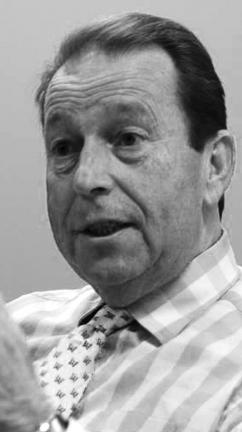John Gildersleeve
meets the king of the high street to discuss Churchill, chess and the kudos of your degree
The media will have us believe many things about the retail world. We are apparently both destroying the planet by using supermarket petrol or putting the butcher, baker and candlestick-maker out of business by buying their cheaper produce. So who are the brains behind the brands?
John Gildersleeve. A name you might not know, but a man whose influence has affected some of the greatest names in retail history. Having joined Tesco Plc. as a trainee manager in 1965 (he spotted the advert in an evening paper), John went on to be closely involved with its international expansion and joined the board for both Lloyds TSB and Vodafone Group Plc. He is currently non-executive chairman of both EMI Records and Carphone Warehouse. Awe-inspired, and desperate to blag myself a free phone or date with Robbie Williams, I met with John to discuss the relevance of degrees and the possibility that corporate success need not rely on a system so many of us believe means selling our souls.
What immediately strikes me about John is his lack of pretence. When talking of his initial experience of food retailing he told me that he knew two things, “that cheese is yellow and meat is red.” Amazed at the informal manner of someone who admits he “cannot live without a blackberry”, I ask him what it’s like to be cited as a mentor by some of the most powerful people in international retail. “This will sound too pompous but as a leader, you have to be able to inspire people to do things.” We talk about the current popularity of management degrees and I am told that despite their educational intentions, “the stardust that differentiates one leader from another is in the DNA.”
 Given this idea that it is our genes that differentiate between the Chiefs and the Indians, what is the point of a degree? John left school with few qualifications and has risen to the top of a field that graduate schemes can only dream of accurately representing. “Well, if you send in a CV and it says that you’ve got a 2:i in Chess, it will go in the bin. If you send one in that says you have a 2:i from Cambridge, the subject is almost irrelevant. All that a degree does is get you the interview…it’s a life qualification.” This pleases me; fifth week blues are finally looking worthwhile and John’s thesis that “it is the individual that gets the job” seems fair. I make a mental note to read up on what my faculty refers to as “transferable skills.”
Given this idea that it is our genes that differentiate between the Chiefs and the Indians, what is the point of a degree? John left school with few qualifications and has risen to the top of a field that graduate schemes can only dream of accurately representing. “Well, if you send in a CV and it says that you’ve got a 2:i in Chess, it will go in the bin. If you send one in that says you have a 2:i from Cambridge, the subject is almost irrelevant. All that a degree does is get you the interview…it’s a life qualification.” This pleases me; fifth week blues are finally looking worthwhile and John’s thesis that “it is the individual that gets the job” seems fair. I make a mental note to read up on what my faculty refers to as “transferable skills.”
Retail is a commercial world where everything is “just business” and John’s particular achievements rely on his renowned knowledge of consumer trends. As he tells me, “every business has a customer by one definition or another.” When he was working at Tesco, the entire board were obliged to spend every Friday on the store floor, asking customers what they thought and trying to gain an insider’s view of where the competition lies. Is the customer always right? I mention the fact that during my brief stint at working on the wrong side of a till, it was difficult to remain tolerant. “Yes, they are always right…at the end of the day it’s the customer who pays the bills.” In contrast to our assumptions of supermarkets as ruthless, unfair corporations we have to accept that they provide us, the customers, with what we want. As John confirms, “at Carphone Warehouse, rule number 1 is that the customer is always right. Rule number 2 is refer to rule number one.” Perhaps we should stop complaining, when, at the end of the day, it is our shopping interests that ensure corporations to succeed. The music industry is, surprisingly, much the same in terms of what we want. John likens it to fashion as “probably the most in flux of all consumer trends” and this makes it a dynamic and challenging business to work in.
Wrestling with the temptation to ask for Robbie’s number, I stay on the more tentative side of celebrity. This is only the second media interview that John has ever given and I ask him why programmes such as Dragon’s Den are yet to appeal to big audiences. “I like to keep my private life private. I don’t consider myself to be famous; programmes like Dragon’s Den would just invade my privacy.” Fame does not mean fortune, then, and John’s phenomenal example shows how we need not sell our souls to enjoy the dynamics of commercial industries.
On my way out I remember my final question: will he ever retire? After such an influential career littered with amazing people, insight to consumer tastes and ground-breaking statistics, I conjure up pictures of golf courses and empty timetables. “Never,” he winks. ‘Just remember what Winston Churchill said – “Never give up, never give up, never give up.”
 News / Newnham postgrads referred to homeless charities as College runs out of rooms31 July 2025
News / Newnham postgrads referred to homeless charities as College runs out of rooms31 July 2025 Arts / William Morris’ little-known labours in Cambridge25 July 2025
Arts / William Morris’ little-known labours in Cambridge25 July 2025 Lifestyle / Break-ups in the bubble31 July 2025
Lifestyle / Break-ups in the bubble31 July 2025 News / Lucy Cav secures £47m loan to expand student accommodation30 July 2025
News / Lucy Cav secures £47m loan to expand student accommodation30 July 2025 Theatre / One year, many stages: the fresher actors behind Cambridge theatre31 July 2025
Theatre / One year, many stages: the fresher actors behind Cambridge theatre31 July 2025








